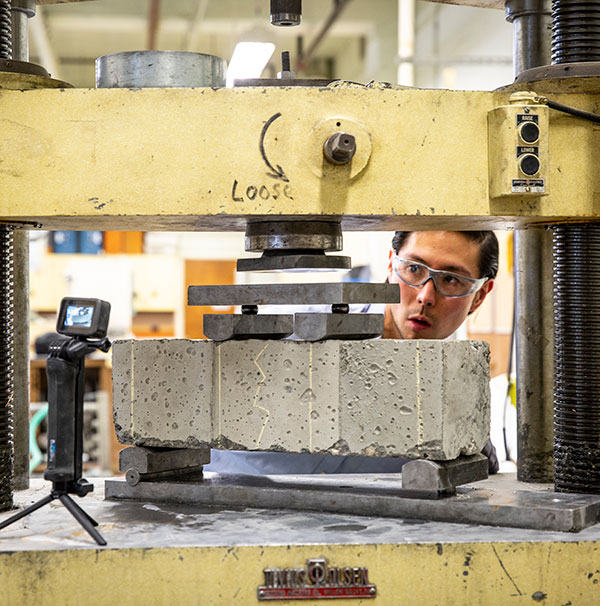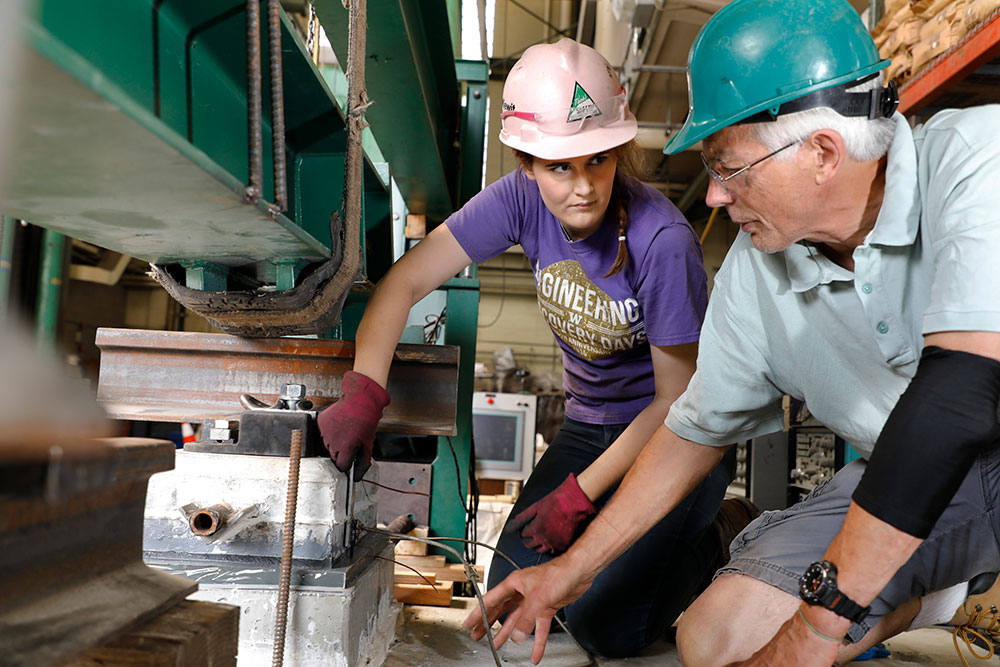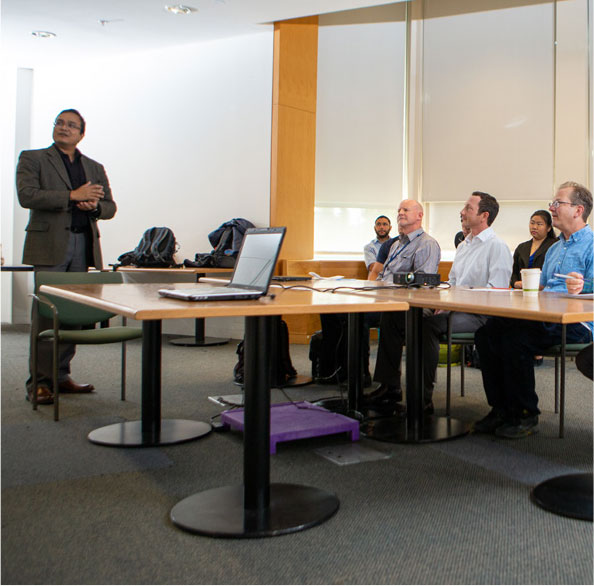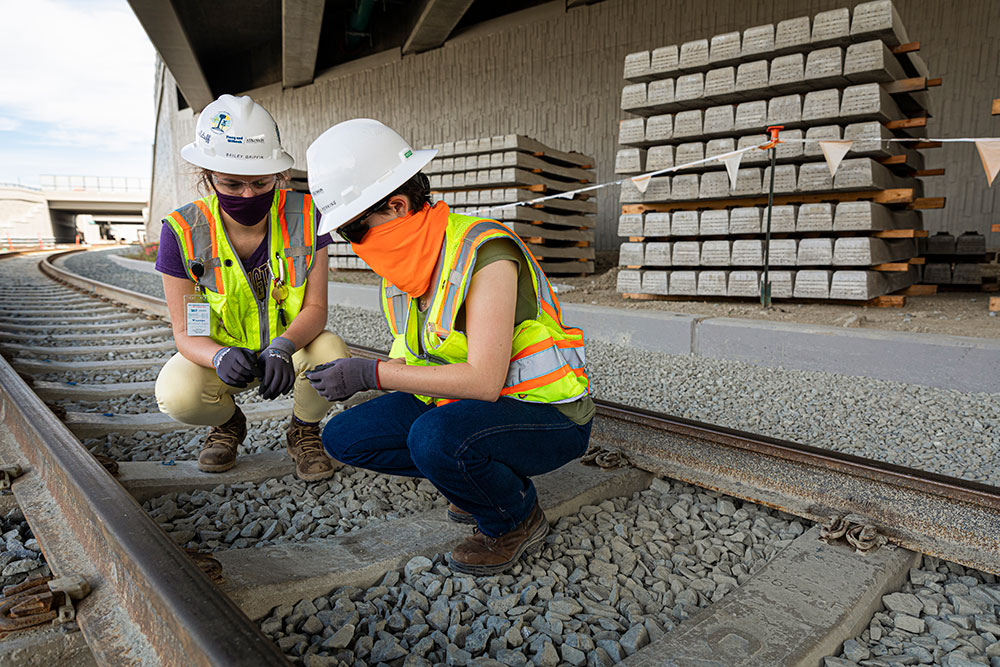By Julia Davis
CEE’s professional master’s programs offer flexible options for many different fields.

The landscape of civil and environmental engineering is constantly evolving, driven by technological advancements and the pressing challenges of modern society. CEE offers a variety of professional master's degrees tailored to meet the needs of practicing engineers and related professionals looking to update their skills and knowledge.

The professional master's programs serve as an educational bridge between the UW and industry, making sure professionals stay up-to-date in their fields. These programs and courses are designed to keep professionals aware of new practices and technologies and cover topics from machine learning to climate change and community resilience to the latest construction materials and cold-region engineering techniques.
Professionals who want to pursue a master's degree while continuing to work full-time can choose between an in-person or online format for their program. The in-person professional master's degrees offer hands-on experiences, allow students to engage directly with faculty and peers, and leverage the UW’s state-of-the-art facilities and on-campus resources.
For those who require more flexibility due to work commitments or geographical constraints, CEE offers four professional master's degrees entirely online. They provide a comprehensive education in areas such as energy infrastructure, construction engineering, supply chain transportation and logistics, and sustainable transportation. These programs give students the freedom to complete coursework from virtually anywhere, offering an invaluable opportunity for professionals who cannot commit to in-person classes.
Here, we outline CEE’s professional degree options, which can serve multiple objectives—from increasing competitiveness in the job market and advancing current careers to acting as a gateway to further academic pursuits, such as a Ph.D.


Mastering civil engineering on campus
More than half of CEE’s professional master’s degree students complete their degrees either partially or completely on campus.

The on-campus programs offer flexible options—students can choose between doing the program part-time while continuing to work or as a full-time graduate student. Many of the on-campus programs include some online class options mixed with in-person courses. With nearly 100 students currently enrolled in on-campus professional programs, it's evident that many students prefer to learn in a classroom.
“The on-campus program is nice because it allows students to experience the University of Washington community in a more tangible way, since they are coming to campus and interacting in a classroom,” says Bryan Crockett, CEE’s director of academic services.
Students entering these programs typically hail from STEM backgrounds, often with prior civil or environmental engineering education. However, the programs are inclusive, welcoming students from diverse STEM disciplines, including chemistry, biology and environmental science. Each program gives students the freedom to tailor their degree based on their interests and career aspirations.
The in-person master’s programs span six specialty areas:
-
Construction, Energy and Sustainable Infrastructure
This program readies students for careers in the construction sector, as well as planning, designing and constructing energy-related or sustainable infrastructure. -
Environmental Engineering
Addressing the pressing challenges of our environment, this program provides a comprehensive background in both traditional and emerging areas of environmental engineering, such as drinking water and wastewater treatment, air and water quality, remediation of contaminated sites and resource recovery. -
Geotechnical Engineering
CEE’s geotechnical engineering program is one of the oldest in the United States and allows students to focus on many different areas of geotechnical engineering, like earthquake engineering, landslide hazards, soil mechanics and foundation engineering. -
Hydrology & Hydrodynamics
For those passionate about freshwater systems, this program offers a deep dive into the physical, chemical and biological intricacies of hydrology. Graduates pursue careers in diverse areas like water resources engineering, coastal engineering, environmental restoration and management, risk management and design of hydraulic systems. -
Structural Engineering and Mechanics
This program offers courses in topics like structural design, multi-hazard structural response, classical theory and advanced structural analysis techniques. In addition to the courses taught by CEE faculty, courses in various engineering disciplines, applied mathematics, architecture and construction management are approved for the program, allowing students to tailor the degrees to meet their professional goals. -
Transportation Engineering
Students in this program have course options on a range of topics like intelligent transportation systems, transit system planning, transportation data analytics, travel demand forecasting, traffic systems operations, freight transportation, human factors and analytics methods in transportation including AI and machine learning.
Study completely online
For those who want to earn a professional master's degree with the flexibility to complete courses from anywhere, CEE offers four fully online programs.
Navigating supply chain complexities
Supply Chain Transportation & Logistics online master’s degree
In recent years, the importance of supply chains in global commerce has become undeniable. CEE’s online Master of Supply Chain Transportation & Logistics (SCTL) program prepares students with the tools to tackle today's industry challenges and anticipate future demands. The curriculum focuses on advanced concepts in transportation and logistics that impact supply chain management and is split into four themes: data-driven decision-making, integration and collaboration, critical thinking and presentation skills.

Unlike other online master's programs, classes in the SCTL degree are aimed at simulating in-person lessons, as opposed to asynchronous instruction, where students access lessons at their own pace. The program begins with a three-day intensive in-person residency, which introduces students to the broad fields of logistics, freight transportation and supply chain management. Students then meet online and have much more interaction with other students in the program in their weekly classes.
“It's an online program but with a very high-touch feeling. [Most of] the classes are synchronous, so we have an instructor who is leading the class,” program director Amelia Regan says. "We really emphasize the human connections between the students and their classmates, the students and the faculty and the many industry experts that contribute to the success of the program."
The program caters to early and mid-career supply chain professionals looking for the skills to qualify for higher-level management positions in the industry. Most students complete the program in two years, but there is flexibility for completion within a year.
Crafting tomorrow’s transportation solutions
Sustainable Transportation online master’s degree
CEE’s online Master of Sustainable Transportation degree stands out as one of the few interdisciplinary programs in the country to bring a sustainability perspective to transportation systems policy and planning. The program covers traditional engineering topics but also brings in urban planning, city design, environmental science and public policy, granting students comprehensive insight into transportation dynamics for both people and freight.

The curriculum combines interdisciplinary subjects like livable communities, technology, environmental impacts, policy development, health and economics. Classes convene online in real-time once weekly during the evenings. Additionally, students undertake a year-long capstone project, applying their knowledge to practical transportation issues.
“We're focused on how our transportation system can be used to make our world better. For example, if you get people out of cars and into buses, there are positive health outcomes such as more walking and less air pollution,” program director Edward McCormack says. “It's a program that trains people about how transportation interfaces with many aspects of our society and provides an opportunity for change.”
The program has attracted a diverse set of students, from urban planners to engineers to attorneys, who want to get more involved in the transportation sector. In essence, the program prepares individuals not just for career advancement but to change the future of transportation on a global scale.
Building the future of construction
Construction Engineering online master’s degree
The online Master in Construction Engineering caters to professionals in the heavy construction industry. The program is a partnership between CEE and the construction management department in the College of Built Environments. It offers a mix of seven courses from each department. As a result, students receive a blend of construction management principles and technical engineering knowledge.
.jpg)
One of the program's goals is to meet the needs of those who might be moving up in the field and taking on more responsibility and management.
“We’re teaching a combination of advanced construction engineering principles and a variety of project management techniques. The program also covers some of the latest advancements in infrastructure construction including utility and energy projects. We also make sure that students get adequate exposure to industry standard software.,” program director Julian Yamaura says.
The program also provides a high degree of flexibility because of the seasonal demands in the construction sector. Students can enroll in the program in any quarter, and the program structure is standardized and predictable, allowing students to plan out their entire degree from the beginning. Courses cover a wide range of topics, from pavement construction and utility construction to cost analysis and energy infrastructure.
A standout feature of the curriculum is its forward-looking approach. While it firmly grounds students in traditional civil engineering principles, it also equips them with skills and knowledge about emerging sectors like energy infrastructure. This prepares students for the future of engineering, ensuring they are market-ready and versatile.
The robust course offerings and the structure make this program ideal for those looking to further their career in the construction industry while balancing professional commitments.
Illuminating the energy landscape
Energy Infrastructure online master’s degree
As global energy systems evolve with emerging technologies, CEE’s Master in Energy Infrastructure remains at the forefront, making sure that those in the field can learn about the latest advancements and tackle future challenges.

The program emphasizes flexibility with its online and asynchronous format. Its instructional approach sets it apart from some of the other degree options. A significant portion of the curriculum is taught by professionals currently working in the industry, which allows students to gain real-world insights that they can immediately implement in their own fields.
The program's curriculum covers every aspect of energy infrastructure at all levels, from planning and design to construction and management. The curriculum also stands out because of its emphasis on multiple one-credit “focus courses” that students can take in conjunction with their core courses. This allows students to hyper-specialize in whatever topic is most relevant to them, from cybersecurity to wind turbine analysis to AutoCAD.
“The one-credit courses are kind of a low-risk option where students can get introduced to these important topics, and then later on, they can explore it on their own time,” says Yamaura, who also directs this program.
Like the construction engineering master's degree, the energy infrastructure degree typically takes students two to three years to complete. The energy infrastructure program allows professionals to keep up with all of the changes happening in energy and advance in their careers in the future.
Looking to advance as an engineer?
Our programs are built in partnership with industry leaders and taught by expert faculty. Gain practical experience and technical skills with formats that fit your schedule — full-time or part-time, online or hybrid, evenings, and even weekends.
Originally published November 27, 2023